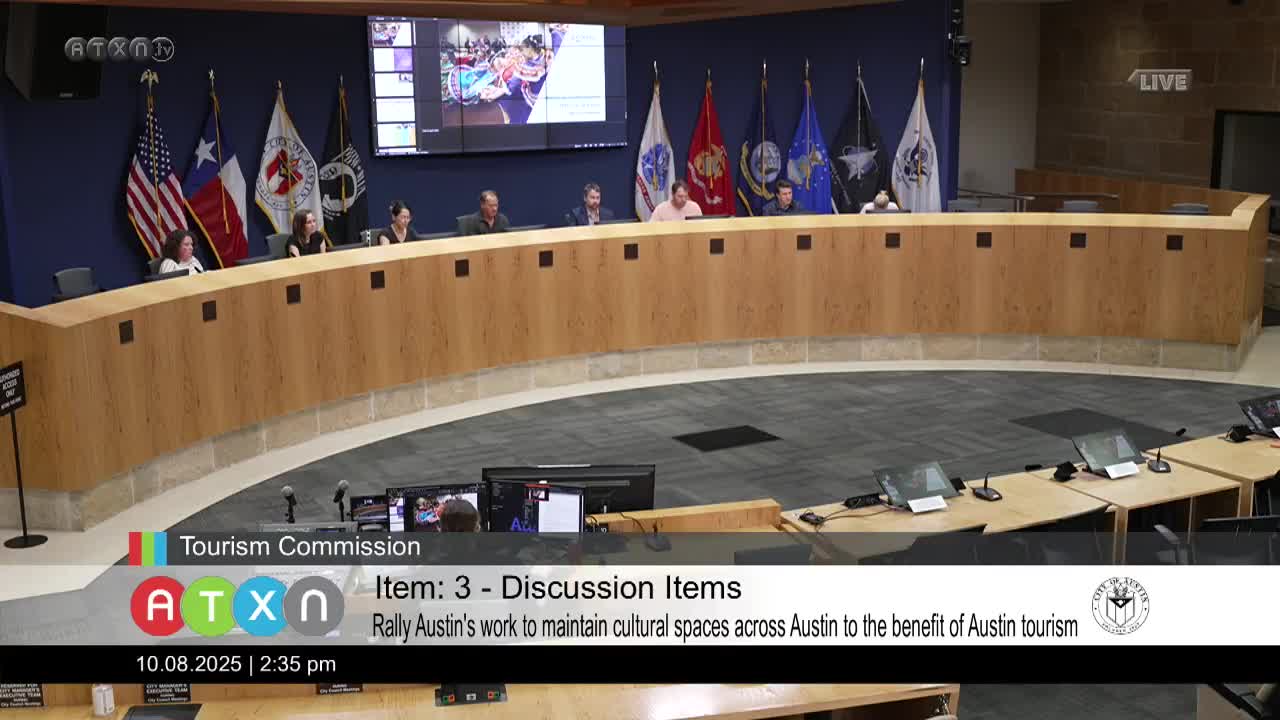Rally Austin pitches roughly $262 million 2026 bond package to preserve cultural and legacy spaces
Get AI-powered insights, summaries, and transcripts
Subscribe
Summary
David Culligan, chief operating officer of Rally Austin, told the Tourism Commission on Oct. 8 that the nonprofit’s proposal for the November 2026 bond election would ask voters to approve roughly $262 million to preserve and create affordable cultural, commercial and live-work spaces for creatives and legacy small businesses in Austin.
David Culligan, chief operating officer of Rally Austin, told the Tourism Commission on Oct. 8 that the nonprofit’s proposal for the November 2026 bond election would ask voters to approve roughly $262 million to preserve and create affordable cultural, commercial and live-work spaces for creatives and legacy small businesses in Austin.
Culligan said the package is organized around three program “verticals”: acquiring property to secure cultural and legacy sites; capital construction and gap financing for facilities; and development of affordable work/living space for artists. "This is a conversation about November 2026," he said, drawing a distinction from the current 2025 tax-rate and bond work.
Why it matters: Culligan argued that loss of affordable commercial space is displacing musicians, artists and legacy businesses that support Austin’s tourism and experience economy. He told the commission Rally Austin (the local government corporation originally formed as the Austin Economic Development Corporation) has been stewarding a portfolio of assets and is seeking city and voter-authorized funds to expand that work.
Key details Culligan provided:
- Total request: Culligan said the full package being discussed with city stakeholders is about $260–$262 million. He presented line items that together make up that figure.
- Property acquisition: Culligan said Rally Austin is requesting about $80 million to acquire sites that would be held long term to secure cultural and legacy uses.
- Capital construction and programmatic finance: Culligan described $50 million proposed for capital construction across projects and additional capital and loan/grant support Rally would leverage to ready sites and support operators.
- Commercial (legacy) trust: He proposed a commercial trust model with roughly $20 million for property acquisition and $20 million for capital improvements to protect long-running small businesses (the presentation used a 20-year definition for "legacy business").
- Affordable live/work space for creatives: Culligan said Rally is proposing about $46.5 million for property acquisition that could support an estimated 50–100 affordable units tailored for creatives, plus capital gap financing.
Culligan cited peer examples — cultural trusts and programs in San Francisco, Chicago, Pittsburgh and Philadelphia — as models for leveraging public and private dollars. He said Rally Austin has so far helped secure tens of thousands of square feet of affordable creative space and wants voter-authorized capacity to scale that work.
Process and dependencies: Culligan described the city’s ongoing process: city departments have inventoried project needs, a mayoral bond advisory task force and departmental working groups are vetting proposals, and City staff and then mayor and council will make final decisions about what appears on the 2026 ballot. He said Rally is seeking inclusion in working-group conversations and the bond advisory task force’s review.
Commissioner questions and staff clarifications:
- Ownership and operating model: Commissioner Chappell asked whether Rally would own acquired properties and how operations would be managed. Culligan said Rally prefers long-term ownership when possible but would use a range of tools, including multi-party agreements, long-term leases and loans to support operators when land acquisition is not feasible. He said agreements with operators have ranged from 20 to 40 years in past projects.
- Funding sources and fiscal mechanics: Vice Chair Bailey and other commissioners asked how hotel occupancy-tax (HOT) dollars and other sources had been used previously. Culligan said prior investments after the 2018 bond included a mix of general funds and HOT dollars for tourism-related projects, but he deferred detailed debt-structure questions to city finance staff and stressed some requested dollars could be programmatic (not requiring city maintenance and operations costs).
- Affordability definitions: Commissioner Privette pressed for a clearer definition of affordability for both commercial creative space and housing; Culligan said Rally is surveying the creative community and working with advisory committees and city partners (including Austin Housing Finance Corporation) to set affordability targets that balance deep affordability with project feasibility using layered funding sources (new market tax credits, LIHTC, philanthropic contributions).
- Accessibility and public benefit: Commissioners asked whether publicly funded spaces would remain accessible and affordable for local residents and families; Culligan said public dollars come with requirements and that project-specific pricing, programming and marketing would be studied to balance accessibility with operator viability.
What the commission did: Commissioners discussed asking staff to draft a formal statement or recommendation for city council in support of funding cultural/legacy preservation through the bond process. No formal resolution or vote on a Rally Austin-specific recommendation occurred at the Oct. 8 meeting; Chair Ronan said the commission could consider a formal recommendation at a future meeting after more details are supplied.
Background and context: Culligan said Rally Austin (the local government corporation formed to support inclusive real estate outcomes) has rebranded from its earlier name and is positioning itself to assemble public, private and philanthropic funding to acquire and steward culturally important spaces. He cited examples of projects where city-owned properties and trusts have been used elsewhere to preserve creative districts. Culligan also presented an economic framing: he said cultural and creative assets contribute a measurable tourism and experience-economy impact that Rally’s proposals aim to protect.
Ending: Commissioners generally welcomed the presentation but said details remain incomplete. Chair Ronan asked staff to return with a draft for the commission to review so it could consider formal action at a later meeting.
